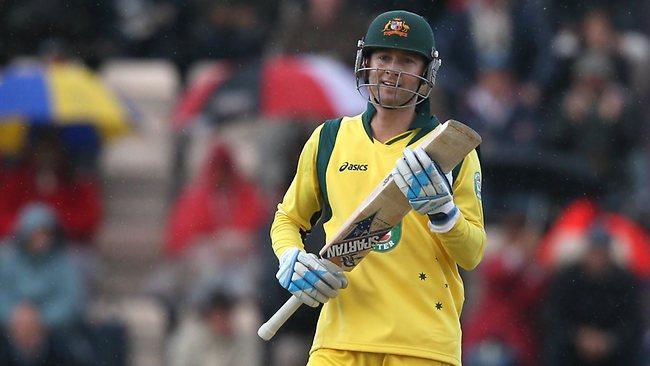Ashes to Ashes, Clarke can hold head high
THE only good thing to be said for the denouement of the international summer in Southampton on Wednesday evening was that it was a fine advert for daytime Test cricket.

THE only good thing to be said for the denouement of the international summer in Southampton on Wednesday evening was that it was a fine advert for daytime Test cricket.
It was bitterly cold - administrators who champion day-night cricket in England really do want their heads examined - and spectators were wrapped up against the chill, watching a formulaic one-sided match, as if they were watching football in February. Grim.
Only a few hardy souls survived until the end. How many of those, I wonder, will go away telling tales of the fabulous time they had at the cricket?
Still, one man who seemed to be enjoying himself was Michael Clarke. He batted jauntily, buzzed around at backward point, despite not being fully fit, accepted his Player of the Series award in good humour and refused to recognise, upon getting his hands around the NatWest Trophy, that this was an irrelevant trinket. It might not mean much to everyone else, he said, with a nod to England's resting senior players, but it means a lot to us.
You can see why. Until then, Clarke had been on the international podium as a winner only twice during the summer. For a team starved of success as Australia have been - Zimbabwe have won more Test matches this year than Clarke's men - a triumph of any kind is gratefully received.
England have been successful for so long now that they have probably forgotten that, but they would have been wise not to do so.
The one-day defeat hardly knocked the gloss off the Ashes win, but it allowed Australia to go home feeling just a little bit better about themselves than they might otherwise have done. From little acorns, and all that.
It was hard not to feel some admiration for Clarke's team, and Clarke himself, whose leadership credentials have been enhanced, despite the occasionally traumatic nature of the tour.
When pundits discuss Clarke's captaincy, the scales tend to be balanced between the good - that is to say his tactical acumen - and what is perceived to be the bad: his ability to manage and get the best out of his players.
In general, the scales have tipped in his favour because tactical nous, imaginative field settings and flair are much more visible than man-management, which takes place behind closed doors. Because we do not really know what goes on in the dressing room, the way he relates to his players can only be guessed at.
Nevertheless, there has been enough anecdotal evidence to suggest that this has not necessarily been a strength. He seems to have fallen out with too many colleagues: his well-publicised difficulties with Shane Watson were a running theme of the early days of the tour; Andrew Symonds has spoken publicly about falling out with Clarke; and it emerged that Simon Katich - solid, sound, sensible Katich - attempted to throttle Clarke three years ago over the traditional singing of the team song.
To fall out with one team-mate might be unfortunate, two a little careless, while the third acts only to highlight the common thread.
Clarke has not always been popular within his own kingdom and was once booed at his home venue, the Sydney Cricket Ground. Partly, this is because he has resisted the stereotype that is expected of Australia captains: the gimlet-eyed, gum-chewing, masculine types that preceded him.
Instead, Clarke has been content to show off the tattoos, the bling and the body, as he famously did during one underwear modelling shoot. When pictures emerged of him with his new bride on a beach, she on a white horse, wedding dress draped over the nag, he holding the reins in one hand and her high heels in another, it furthered the impression of a man a little too interested in his image.
Put bluntly, he did not appear to be the kind of leader prepared to get his hands dirty, something reinforced in the early days of the tour when he went missing. As Australia's Champions Trophy campaign lurched from one underwhelming performance to another, Clarke was nowhere to be seen, except at a charity function for his great mate, Shane Warne. He was hardly idle, getting treatment for his back condition in London, but when he appeared with Warne, his priorities seemed a little skewed.
With the sacking of Mickey Arthur as coach and a shellacking in the second Test at Lord's, Clarke's captaincy had the potential to implode disastrously.
After Lord's, Australia played the better cricket and were ill served by the weather, which cost them at Old Trafford and The Oval. It was Alastair Cook who began to appear the more careworn, weighed down by the expectation that settles on an England captain and by his lack of form.
Clarke, meanwhile, played superbly at Old Trafford and finished strongly with the Player of the Series award in the one-day games and with the silverware, as Cook attempted to revitalise down on the family farm.
It was not a glamorous last month. Rain caused two washouts, England's experimental team hinted at the lack of importance that they attached to the series and, having been in England for three months and more, Australia's players must have yearned for home.
In that context, Clarke's upbeat captaincy, form and general enthusiasm were impressive. He gave the impression that he was prepared to go that extra yard, especially in the final match when he was clearly feeling his back.
The next time he asks his players for a little extra, he will do so from a sound base. It would be wrong to say that Clarke left these shores a winner, but he left with his reputation as a leader enhanced.
The Times




